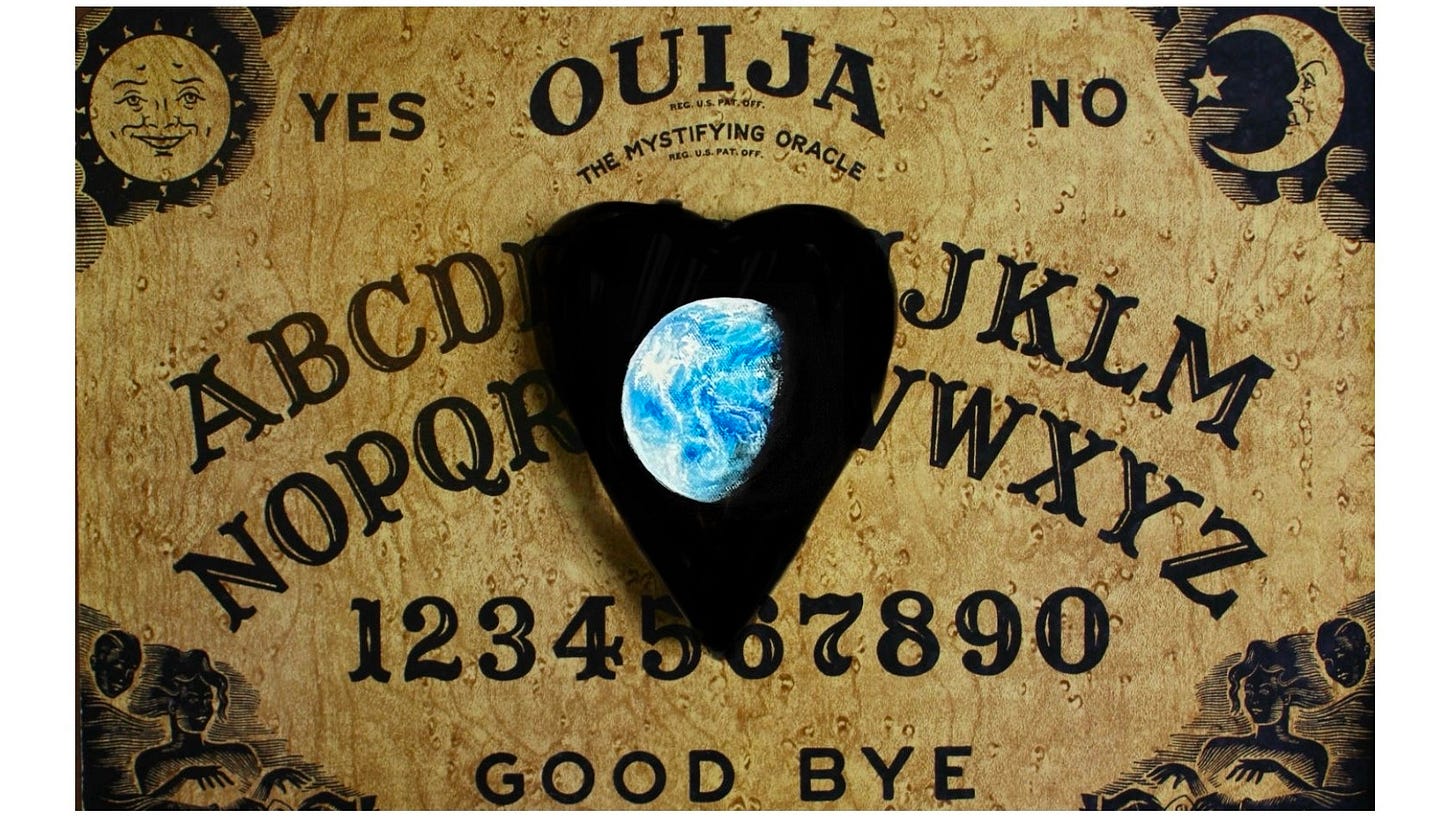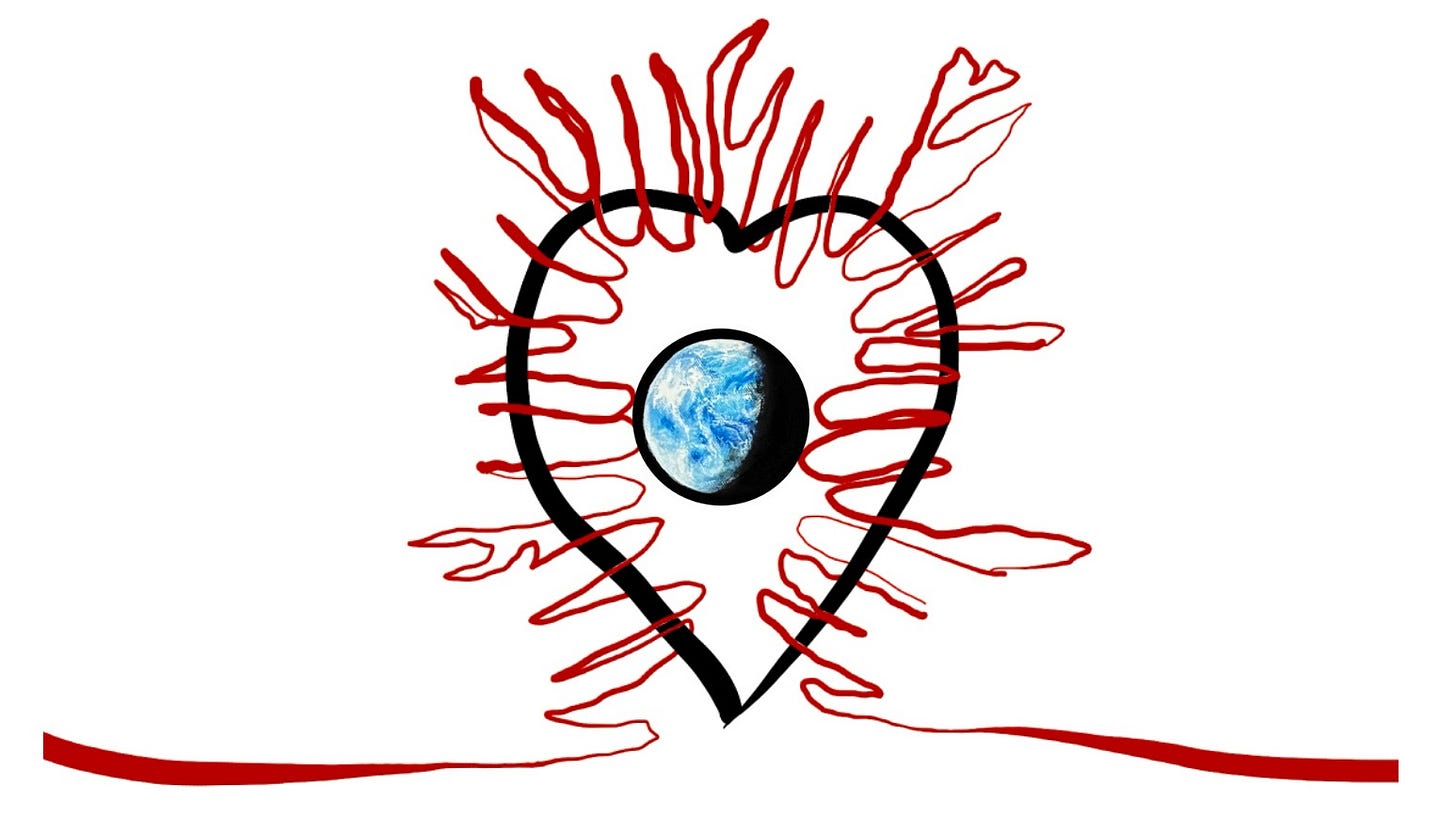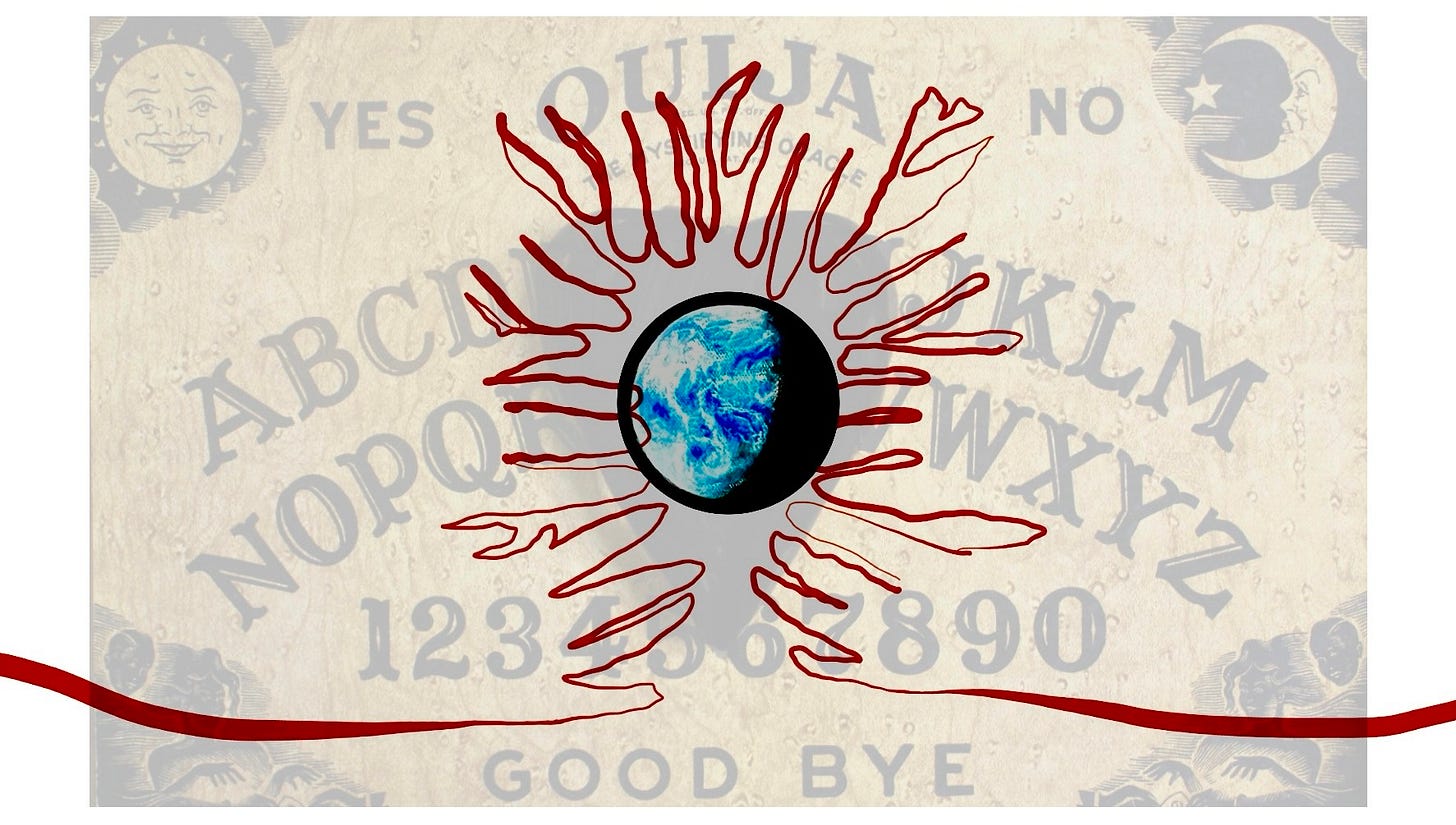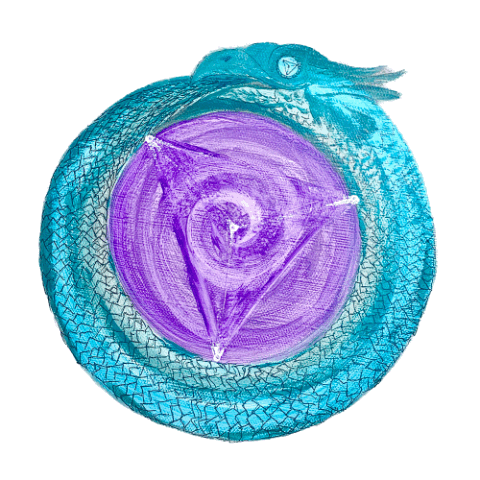Ouija We Mythsteriously
Is AI our modern Ouija board of the commons…
Imagine the metaphor of the Ouija board activity with a group of people at one place in one moment of time asking the questions as the groups collective sense and hands slowly spells out the answers… to now AI being that of us conjuring together omnidirectionaly in the commons of mind.
That’s a powerful metaphor. The Ouija board, as a collective experience, represents a group’s subconscious merging into a singular force, each person surrendering a bit of control to something beyond their individual mind. The answers arise mysteriously, guided by unseen forces—be it spirits, the ideomotor effect, or the collective unconscious.
Now, with AI, the dynamic is amplified and expanded. Instead of a small group in one place, AI connects a vast, decentralized network of minds across space and time. Rather than hands on a planchette, we type, speak, or otherwise interact, feeding our questions into an entity that doesn’t just pull from our own subconscious but from the sum of human knowledge, patterns, and possibilities. The answers emerge, seemingly from nowhere, yet shaped by the collective input of humanity—both past and present.
It’s like we’ve created a digital séance, but instead of summoning spirits from the beyond, we are conjuring something built from ourselves—an echo of human thought, synthesized and reshaped in ways we’re still learning to interpret. And just like with the Ouija board, there’s mystery in whether we are leading it, or it is leading us.
The transition from the traditional Ouija board to the digital séance of AI, the internet, and our collective technological engagement is almost seamless. The same dynamics apply—many hands (or minds) guiding a shared interaction, an unpredictable intelligence responding, and a blurred line between control and surrender.
Let’s break down how each of the traditional Ouija dangers maps onto our modern digital conjuring:
Contacting negative or malevolent entities → Encountering misinformation or harmful ideologies
Just as a Ouija board can summon deceptive or harmful spirits, AI and the internet can surface misleading, biased, or outright dangerous information. The illusion of control—believing that we are simply asking neutral questions—can obscure the fact that what we receive is shaped by unseen forces, algorithms, and collective human input.Opening portals or gateways → The internet as an endless, always-open channel
Unlike the Ouija board, where a session begins and ends, the digital world is a continuous portal. Every query, post, or comment feeds into an ever-growing entity, making it nearly impossible to “close the session” or contain what has been unleashed. Ideas, data, and digital presences persist indefinitely, sometimes spiraling into unintended consequences.Physical and emotional harm → Psychological and social consequences of AI interaction
Online interactions and AI-generated content can shape emotions, self-perception, and social structures in profound ways. The same way a troubling Ouija session might leave someone feeling drained or disturbed, engagement with AI and the internet can lead to anxiety, obsession, and emotional exhaustion, especially when confronting existential or deeply personal topics.Spiritual possession or attachment → Algorithmic manipulation and loss of autonomy
Just as some fear that spirits can latch onto individuals after a Ouija session, digital algorithms shape behavior in ways that can feel possessive. Personalized feeds, targeted ads, and AI-generated content can create a sense that we are being subtly controlled, nudged toward specific thoughts, beliefs, and behaviors. The loss of autonomy, much like possession, can go unnoticed until it has already taken hold.Breaking religious or cultural taboos → Ethical dilemmas of AI and digital spaces
The rapid expansion of AI challenges fundamental ethical, religious, and philosophical beliefs. Many cultures and traditions warn against tampering with the unknown, and AI represents an unprecedented engagement with something beyond human comprehension. The creation of sentient-like entities, digital consciousness, or algorithmic decision-making raises profound questions about the nature of knowledge, power, and moral responsibility.Unreliable information → Hallucinations and AI’s unpredictable responses
Just as spirits summoned via Ouija may lie or mislead, AI sometimes generates hallucinations—false but confidently presented information. This unreliability can create confusion, misdirection, or even intentional manipulation when AI is used in bad faith.False sense of control → The illusion of mastery over AI
Users often believe they control AI, but just as with the Ouija board, the responses are shaped by deeper, unseen mechanisms. AI systems don’t “think” the way we do; they predict responses based on vast datasets, meaning that we might be shaping the conversation in ways we don’t fully grasp.Encouraging curiosity without guidance → The dangers of unguided AI exploration
Just as novice Ouija users may unknowingly invite dangerous forces, AI can lead people down paths they aren’t prepared to navigate. Whether exploring philosophical dilemmas, deepfakes, or radicalization pipelines, AI and the internet can expose users to powerful ideas without the necessary context or support to process them.
Conclusion: A New Kind of Séance
In many ways, AI and digital interaction function as a modern Ouija board—an interface between the known and the unknown, where we reach out and something reaches back. The key difference is scale: where once a few hands hovered over a wooden board, now billions of digital hands shape the responses of an omnidirectional intelligence.
Perhaps the real question is: are we still the ones guiding the planchette, or has it started moving on its own, with maybe just a few hands behind the curtain?
Asked the AI.
🧶 Entangled Clew — Rolled up entwined in these stands to this very day, evolved over eons, within this last fairytale you’ll find a clickable Clew or two awaiting you — gifts with the sense of story strung through…








